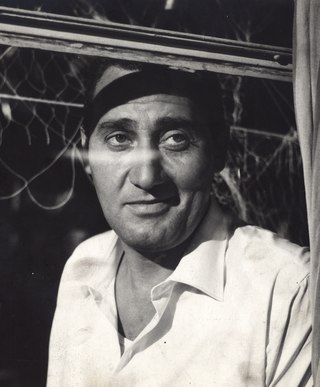
Alberto Sordi was an Italian actor, comedian, voice dubber, director, singer, composer and screenwriter.
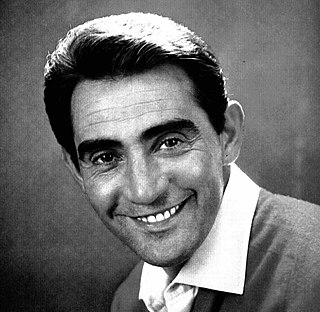
Walter Annicchiarico, known as Walter Chiari, was an Italian stage and screen actor, mostly in comedy roles.

Enzo Petito was an Italian film and stage character actor. A theatre actor under Eduardo De Filippo in the 1950s in the Teatro San Ferdinando of Naples, with whom he was professionally closely associated, Petito also appeared in several of his films, often co-starring Eduardo or/and brother, Peppino De Filippo, brothers who are considered to be amongst the greatest Italian actors of the 20th century. Petito played minor roles in some memorable commedia all'Italiana movies directed by the likes of Dino Risi and Mario Monicelli in the late 1950s and early 1960s, often appearing alongside actors such as Nino Manfredi, Alberto Sordi, Peppino De Filippo, Anna Maria Ferrero, and Totò.

Commedia all'italiana, or Italian-style comedy, is an Italian film genre born in Italy in the 1950s and developed in the 1960s and 1970s. It is widely considered to have started with Mario Monicelli's Big Deal on Madonna Street in 1958, and derives its name from the title of Pietro Germi's Divorce Italian Style (1961). According to most of the critics, La Terrazza (1980) by Ettore Scola is the last work considered part of the commedia all'italiana.

The Cadets of Gascony is a 1950 Italian comedy film directed by Mario Mattoli and starring Walter Chiari, Carlo Campanini and Mario Riva. It was shot at the Farnesina Studios in Rome, with sets designed by the art director Leonidas Marcolis. Location shooting took place at Bracciano in Lazio where the film is set. It earned 450 million lira at the Italian box office.

The Steamship Owner is a 1951 Italian comedy film directed by Mario Mattoli and starring Walter Chiari, Delia Scala and Carlo Campanini. The film's sets were designed by the art director Alberto Boccianti.

Made in Italy is a 1965 Italian anthology comedy film directed by Nanni Loy.

Thrilling is a 1965 Italian comedy film. The film is split into three distinct segments, each directed by a different director; namely Carlo Lizzani, Ettore Scola and Gian Luigi Polidoro.

It Was She Who Wanted It! is a 1953 Italian comedy film directed by Marino Girolami and starring Walter Chiari, Lucia Bosè and Carlo Campanini. The film's sets were designed by the art director Alberto Boccianti. It involves the emotional bickering between a psychiatrist and a rather brusque boxer.
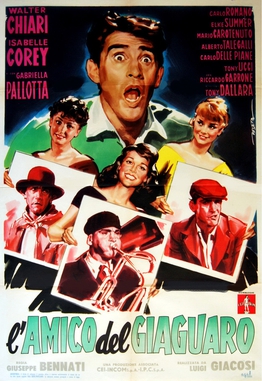
The Friend of the Jaguar is a 1959 Italian comedy film directed by Giuseppe Bennati and starring Walter Chiari, Isabelle Corey and Carlo Romano. The film's sets were designed by the art director Piero Filippone.

A Girl Called Jules is a 1970 Italian drama film directed by Tonino Valerii.

Daniela Poggi is an Italian film and stage actress and television presenter.
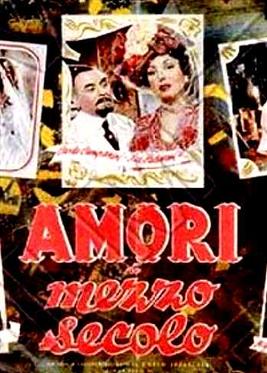
Mid-Century Loves is a 1954 Italian anthology historical melodrama film consisting of five segments directed by Glauco Pellegrini, Pietro Germi, Mario Chiari, Roberto Rossellini and Antonio Pietrangeli.

I motorizzati is a 1962 Italian anthology comedy film directed by Camillo Mastrocinque, consisting of five segments all sharing cars as main theme.
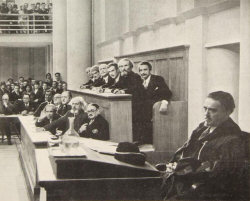
Before the Jury is a 1931 Italian crime film directed by Guido Brignone and starring Marcella Albani, Lia Franca and Carlo Ninchi. It was made at the Cines Studios in Rome. The film is a precursor to the later genre of Giallo films.

The Son of the Red Corsair is a 1959 Italian historical adventure film written and directed by Primo Zeglio and starring Lex Barker, Sylvia Lopez and Vira Silenti. It is based on the novel with the same name by Emilio Salgari. The story had previously been made into a 1943 film The Son of the Red Corsair.

Wives and Obscurities is a 1956 Italian comedy film directed by Leonardo De Mitri and starring Gino Cervi, Walter Chiari and Enrico Viarisio.

It Happened at the Police Station is a 1954 Italian comedy film directed by Giorgio Simonelli and starring Nino Taranto, Alberto Sordi and Walter Chiari.

The Most Beautiful Couple in the World is a 1968 Italian "musicarello" comedy film directed by Camillo Mastrocinque and starring Walter Chiari, Paola Quattrini and Aldo Giuffrè.



















